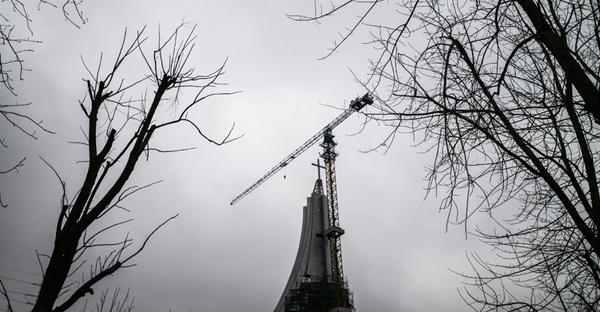[ad_1]

The church at Xingsha Ecological Park in Changsha, China. About 260 feet tall, it is bigger than the largest statue of Mao Zedong in China, which is nearby. (Credit: Lam Yik Fei for The New York Times)
Sweeping heavenward like an enormous glass-and-metal ski jump, a new Protestant church dominates the crumbled earth, freshly planted trees and unfinished water features of a suburban park under construction in Changsha.
About 260 feet tall and topped by a cross, the Xingsha Church is bigger even than the biggest statue of Mao Zedong in China, less than 10 miles west of here.
On Tangerine Island, in the broad Xiang River, the massive granite head and shoulders of the revolutionary leader rear up as if surveying the world. But at 105 feet, the sculpture is still less than half the height of the church.
That disparity, in the very city where Mao spent his youth and first embraced politically radical ideas, has infuriated his most fervent admirers across China.
Sensing an ideological challenge to their hero — who founded the People’s Republic in 1949 and denounced Christianity as a tool of foreign imperialism — thousands of Mao’s “red” fans reached for their smartphones and computers this year and charged into verbal battle against this defilement of sacred ground.
They railed against the church’s size and symbolism, saying that building it in a public space was a misappropriation of resources in the officially atheist state.
“Going for Christianity in a big way damages our nation’s ideological security,” wrote Zhao Danyang of the website Red Morality Think Tank, in a typical post when the furor erupted in February.
Wary of a political crisis, Changsha officials rushed to tamp down the controversy.
Guards were posted at the Xingsha Ecological Park, where the church, a Bible studies center, administrative offices and residential quarters are near a Cupid Garden for local sweethearts. News reports vanished from the internet. Public debate fizzled. Multiple telephone calls to the provincial headquarters of the state-run Protestant association went unanswered. A bell jar of censorship descended.
But on the streets of Changsha, the capital of Hunan Province, residents seem to know or care little about the clash of Christianity and Communism in their midst. Asked about it, several people shrugged and declined to comment, or said they had not heard of it.
If such grass-roots insouciance in Mao’s former home seems surprising, to one resident it makes perfect sense.
“In Hunan, contradictions are not contradictions. They’re normal,” said Han Shaogong, the author of “A Dictionary of Maqiao,” a novel that explores the hilly region’s extraordinary linguistic diversity. “Life here is a bit like Chinese food. Throw lots of different things into a wok and stir them around.”
In the village outside Changsha where he farms and writes, Mr. Han said, Christianity coexists happily with other traditions. “There are a couple of old ladies who believe in Jesus, but they believe in Buddha, too,” he said.
Although the Communist state suppressed religion as superstition until after Mao’s death in 1976, it recognized five faiths — Protestantism, Catholicism, Buddhism, Taoism and Islam — which are managed through “patriotic” associations.
Estimates vary, but many put the number of Protestants at about 60 million, half of them adherents of the government-approved church, the rest worshiping in illegal “house churches.” A Protestant cleric at the Xingsha Ecological Park, who gave only his surname, Jiang, said Changsha’s official Protestant churches had about 100,000 members.
Reminders of Mao’s connection to the city are everywhere. His image, on wall-mounted illuminated boxes, decorates the new subway. Restaurants advertise his favorite dishes, including fatty red braised pork. Chiles, also loved by Mao, fire up the cuisine.
“We really like chile,” Mr. Han said. “And we’re hot-tempered. It’s seen as a sign of strength.”
Click here to read more.
SOURCE: The New York Times
Didi Kirsten Tatlow
Related
[ad_2]
Source link
